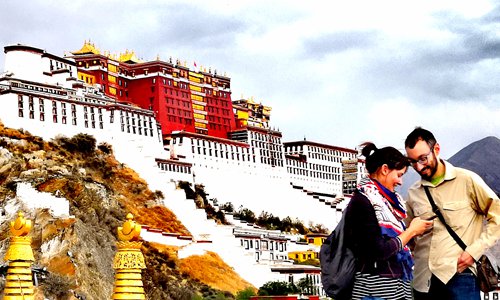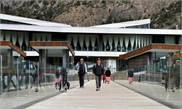
Photo: IC
It has been reported that US Ambassador to China Terry Branstad paid an official visit to China's Tibet Autonomous Region in May. Yet it is hard to figure out his true feelings about Tibet. On the one hand, he spoke positively of Tibet's economic and social development, which disproved the Dalai Lama group's lie about the destruction of Tibet's environment by the Qinghai-Tibet Railway. On the other, he repeated the hackneyed remarks of the US government, "I encourage the Chinese government to engage in substantive dialogue with the Dalai Lama or his representatives, without preconditions, to seek a settlement that resolves differences."The problem lies not only in Ambassador Branstad's interference in China's internal affairs, but also in his understanding of "seeking a settlement that resolves differences without preconditions" and "substantive dialogue."
The Dalai Lama group takes splitting the country as its goal. However, the Central Committee of the Communist Party of China (CPC) has not closed its door of contacts and negotiation with the Dalai Lama. Yet the proposed negotiation comes with preconditions.
First, it must be made clear that in nature, contact and consultation are not talks between China's central government and the Tibetan government-in-exile or "Central Tibetan Administration," nor are "Tibetan-Han Talks" or "Tibetan-China Talks." The Dalai separatist political group is illegitimate and ineligible to have a "dialogue" with representatives of the CPC Central Committee.
Second, it needs to be clarified that the Dalai Lama must accept Tibet as an integral part of China, abandon all attempts about so-called Tibet independence, stop all separatist and destructive activities, and recognize Taiwan as an integral part of China.
The two preconditions mentioned above underline that there is no so-called Tibet issue but just the problem of the Dalai Lama. The Dalai group, whose existence is against the Chinese Constitution, is not at all eligible to discuss Tibetan affairs with the CPC Central Committee.
While suggesting that the Chinese government engage in a "substantive" dialogue with the Dalai Lama, Ambassador Branstad, like his government, has once again avoided explaining what a "substantive" issue is.
The "substantive" issues in the eyes of the Dalai Lama at least include denying that Tibet has been a part of China since ancient times; defining Tibet as a "state" occupied by China; demanding his "rule" be extended to the whole of Tibet, Qinghai, as well as two autonomous prefectures in Sichuan, one in Yunnan and one in Gansu - an area equal to one fourth of China's territory; requiring the People's Liberation Army (PLA) withdraw from Tibetan areas and make it a so-called international zone of peace under the control of Western countries; requiring all the Han people who settled down in Tibet return to where they came from - in other words, to implement ethnic cleansing in all Tibetan areas.
If the US government insists that "substantive" dialogue means meeting all the aforementioned requests of the Dalai Lama, then its hopes would be dashed.
During his visit to Tibet, Branstad met with the leaders of the Tibet Autonomous Region and Lhasa city, visited local communities, educational and cultural institutions and religious sites, which at least improved his understanding of Tibet. I believe that the knowledge he gained from the trip will help him in his career.
Since the peaceful liberation, especially since the reform and opening-up, Tibet has witnessed rapid economic and social development, with people's livelihood improving and the environment getting better and better. From my point of view, China could and should create conditions for more foreigners to visit Tibet and encourage them to draw their own conclusions based on what they see. Tibet's door has always been open to foreigners. Though under special situations when the Dalai clique has created a disturbance, administrative measures are enhanced for a certain period of time, but after that, the further opening-up follows.
We must start from the needs of stability and development in Tibet. Of course, we hope that more foreign friends will know about Tibet and foreign media will report positive things about the region. But the most important thing is to avoid violating the interests of the country and the people.
The author is former head of the Ethnic and Religious Affairs Committee of the National Committee of the Chinese People's Political Consultative Conference. opinion@globaltimes.com.cn


